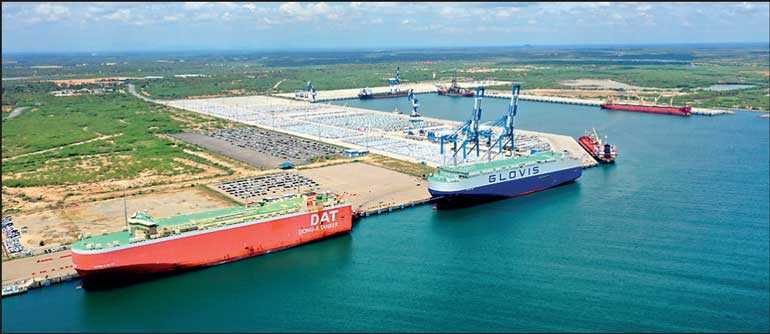Wednesday Feb 25, 2026
Wednesday Feb 25, 2026
Saturday, 28 December 2019 00:03 - - {{hitsCtrl.values.hits}}

Hambantota Port
Xinhua: A master plan for developing industries around Sri Lanka’s southern Hambantota Port is on the horizon, says Ravindra Jayawickrema, CEO of Hambantota International Port Services (HIPS), which is a subsidiary of port operator Hambantota International Ports Group (HIPG).
Jayawickrema told Xinhua in an interview that a master plan for industries, undertaken by an international group of companies who are competent in the field, has almost been finalised.
“What is being envisaged is to allocate a certain area of land within the port for various light, heavy and food industries,” he said.
Once the plan is finalised, the port operator HIPG will go to the market to entice investors to set up export-oriented manufacturing to take advantage of Hambantota Port’s free port policy and strategic access to one of the world’s busiest shipping lanes located just a few nautical miles south of the port.
Along with industrial development, Jayawickrema says the port operator hopes to catch the container overflow from the congested Port of Colombo and develop Hambantota’s bunkering and fuel supply operations once the tank farm comes into operation early next year.
“Sri Lanka lies between Singapore and Fujairah, two of the largest fuel depots in the world that supply over 60 million tonnes of fuel per year. We are trying to tap into that market to a certain extent,” he said.
According to Jayawickrema, shipment volumes at Hambantota have tripled since 2017. The majority of this is trans-shipments, followed by imports. While exports are yet to take off, imports coming through the port have created economic opportunities for locals.
As the majority of Sri Lankan automobile imports arrive through the Hambantota Port, Jayawickrema noted that entrepreneurs have set up vehicle repair yards around the port and created jobs for locals. The port also imports slag and clinker, raw materials used by local cement manufacturers.
Dispelling rumours of a “Chinese take-over” in Hambantota, Jayawickrema emphasised that the port is governed by the Sri Lanka Ports Authority Act.
“All ships entering the port have to gain approval from the Harbourmaster in Colombo. The pilots who bring the ships in and out of the port are direct employees of the Sri Lanka Ports Authority,” he said.
The Hambantota Port recently celebrated the second anniversary since operations were given on a 99-year lease to HIPG, a joint venture between the China Merchants Port Holdings and the Sri Lanka Ports Authority (SLPA).